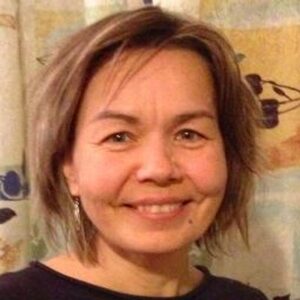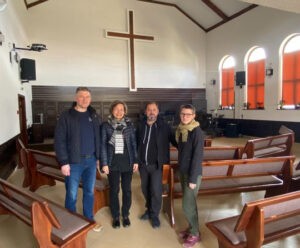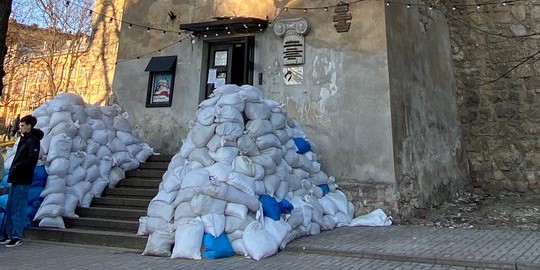Lviv has many faces. It is a beautiful city with rich history, majestic architecture, elegant cafes and a joyful atmosphere. Ukrainians call it the capital of coffee, chocolate and street music.
All this is here when Rachel and I walk around the Lviv old town on Sunday afternoon. People enjoy the first signs of spring on the streets of Lviv. Men play chess on a park bench. Children climb a monument in the city square. Cafes are full of friends getting together. Women sell flowers on the streets. Musicians perform for crowds of people in colorful clothes. It is difficult to imagine that not far from here, missiles fly, houses are being bombed and people lack food, water and a safe place to be.

Helle Liht
Lviv is peaceful. Lviv is beautiful.
The reality of the war hits me when the air sirens go off in the middle of the night and the hotel guests are guided to the bomb shelter across the street. Sitting for 45 minutes in a chilly and humid basement on a squeaky chair makes me think of people who must spend days in such an environment to stay safe.
Other reminders of the war include metal or plywood covered church windows and sand sacks piled around the sculptures. The people of Lviv are proud of their art and culture, and together they have made efforts to protect them from destruction.
Although these few signs remind me that there is a potential threat around the corner, it is only talking to the people that brings the horror of the war to my consciousness.
We met with the people of Lviv churches and the staff of the Ukrainian Baptist Union. Every person has their own painful story about the war. Homes are left behind, sometimes even a couple of times when fleeing from the Crimea or Luhansk and Donetsk regions. Separation from family. Destruction of church buildings. No place to go back to. Family members are kept in occupied territories with no guarantee of their safety. Seeing people wounded and dying on the streets. Escaping from the bombs.
None of these experiences can be adequately described with words, yet the pain is visible in their eyes when we talk. The pain that is deep inside and which has no reasonable explanation apart from pure evil trying to take ground. Evil never ever makes sense.
“Evil never ever makes sense.”
Yet there is something stronger and more powerful present in their eyes and in their words than the deep pain. This is faith and hope in the Risen Christ. Ukrainian Baptists are truly Easter people in a Good Friday world. It is this faith and hope that enables them to transform their own pain into a blessing for others.

The author with other Baptist leaders in a Ukrainian church.
The famous words, “Make pain your teacher and not your master,” come to my mind when I listen to their stories. Ukrainian Baptists don’t let their pain overcome them and produce anger, bitterness and revenge. They have invited this pain to be their teacher so that they can understand and be open to the pain of others.
Thousands of people are being helped with food and shelter and even more with a friendly word, supporting prayer and hope for the future. All this is done in the power of God and in the name of the Risen Christ.
Христос воскрес! Воістину воскрес!
Christ is Risen! He is risen indeed!
Helle Liht serves as assistant general secretary of the European Baptist Fellowship. She and Rachel Conway-Doel, overseas team leader for BMS World Mission, visited Lviv, Ukraine, April 9-13.
Related articles:
In liberated areas of Ukraine, church volunteers help sweep for mines
Let’s be clear: Putin’s invasion of Ukraine is not about the rapture and Russia in biblical prophecy | Analysis by Rodney Kennedy
Religious liberty in Ukraine is ‘doomed’ if Russian invasion succeeds

